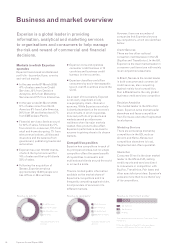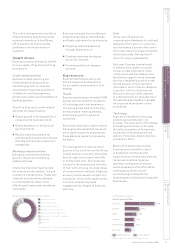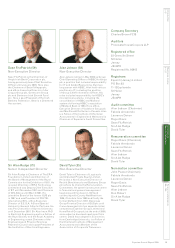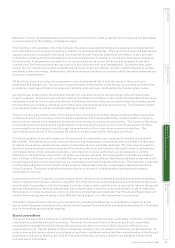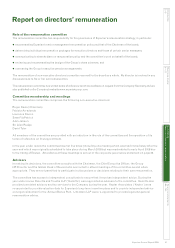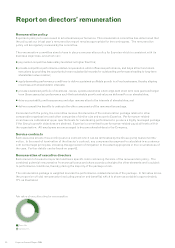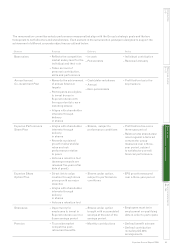Experian 2008 Annual Report Download - page 46
Download and view the complete annual report
Please find page 46 of the 2008 Experian annual report below. You can navigate through the pages in the report by either clicking on the pages listed below, or by using the keyword search tool below to find specific information within the annual report.44 Experian Annual Report 2008
Corporate governance statement
Combined Code
The board of Experian is responsible for the Group’s system of corporate governance. The board is committed to
good governance and to maintaining the highest standards of integrity in all the Group’s activities. This statement
describes how the Company has applied the main and supporting principles set out in Section 1 of the Combined
Code on Corporate Governance published by the UK Financial Reporting Council in June 2006 (the ‘Code’).
Experian complied with the Code’s provisions throughout the year from 1 April 2007 until 31 March 2008, except that
the board committees did not for the whole period fully comply with the requirements in respect of the number of
independent non-executive directors. These matters are explained later in this statement.
The way in which the principles set out in the Code are applied is described below.
The board
At the date of this annual report, the board consists of a Chairman, a Chief Executive Officer, a Chief Financial Officer
and seven non-executive directors. The names and biographical details of the directors are shown on pages 38 and 39 of
this annual report.
The non-executive directors are considered by the board to be independent in character and judgment with no
relationships or circumstances which could affect, or appear to affect, their judgment. However, David Tyler was the group
finance director of GUS plc and so did not fully meet the independence criteria on his appointment. The non-executive
directors are appointed for three-year renewable terms. Sir Alan Rudge is the senior independent director.
The board plans to have six scheduled meetings each year and may meet more frequently as required. Six scheduled
meetings and one ad-hoc meeting took place during the year ended 31 March 2008 (this includes one meeting that was held
immediately after the year-end which was originally scheduled to take place during March 2008 but was rescheduled to
early April 2008 due to the timing of Easter). The latter meeting took place in Washington DC, USA; otherwise the meetings
were held in Dublin, Ireland. It is inevitable that there will be occasions when circumstances arise to prevent directors
from attending meetings. In such circumstances, the usual practice is for the absent director to review the board papers
and convey any views on specific issues to the Chairman. The time commitment expected of non-executive directors is
not restricted to board and committee meetings. They are available for consultation on specific issues falling within their
particular fields of expertise and additional time is spent visiting the Group’s businesses and meeting informally with the
Chairman and executive directors. The non-executive directors are experienced and influential individuals from a range
of industries and countries. Together they bring an objective viewpoint and range of experience to the Company which
ensures that no individual or group of individuals is able to dominate the board’s decision-making.
There is a formal schedule of matters specifically reserved to the board for decision. The board establishes overall
Group strategy, approves the Group’s operating budget and monitors performance through the receipt of monthly
reports and management accounts. The approval of significant acquisitions and divestments is a matter reserved for
the board although it delegates to the boards of the Company’s principal operating subsidiaries the responsibility for
approving smaller acquisitions and disposals. The monetary limits of such delegations are formally documented and
the exercise of such delegated authorities is reported to the board at each of its meetings. There are also authority
levels covering capital expenditure which can be exercised by the boards of the Company’s principal operating
subsidiaries. Beyond these levels of authority, projects are referred to the board for approval. Other matters reserved
for the board include:
Approval of half-yearly financial reports and annual financial statements.
l
Treasury policies. l
Internal controls and risk management. l
Succession planning. l
Corporate responsibility. l
The division of responsibilities between the Chairman and the Chief Executive Officer is clearly established, set out in
writing and agreed by the board. The Chief Executive Officer is responsible for day to day management and performance
of the Group’s businesses. The Chairman’s role is to ensure good corporate governance which includes leading the
board, ensuring its effectiveness in all aspects of its role and setting its agenda. For scheduled board meetings, the
agenda includes reports from the Chief Executive Officer and the Chief Financial Officer. The January meeting focuses
on strategy, the March meeting deals with the approval of operating budgets for the coming financial year, while the
May and November meetings cover the approval of the annual financial statements and the half-yearly financial report
respectively.




